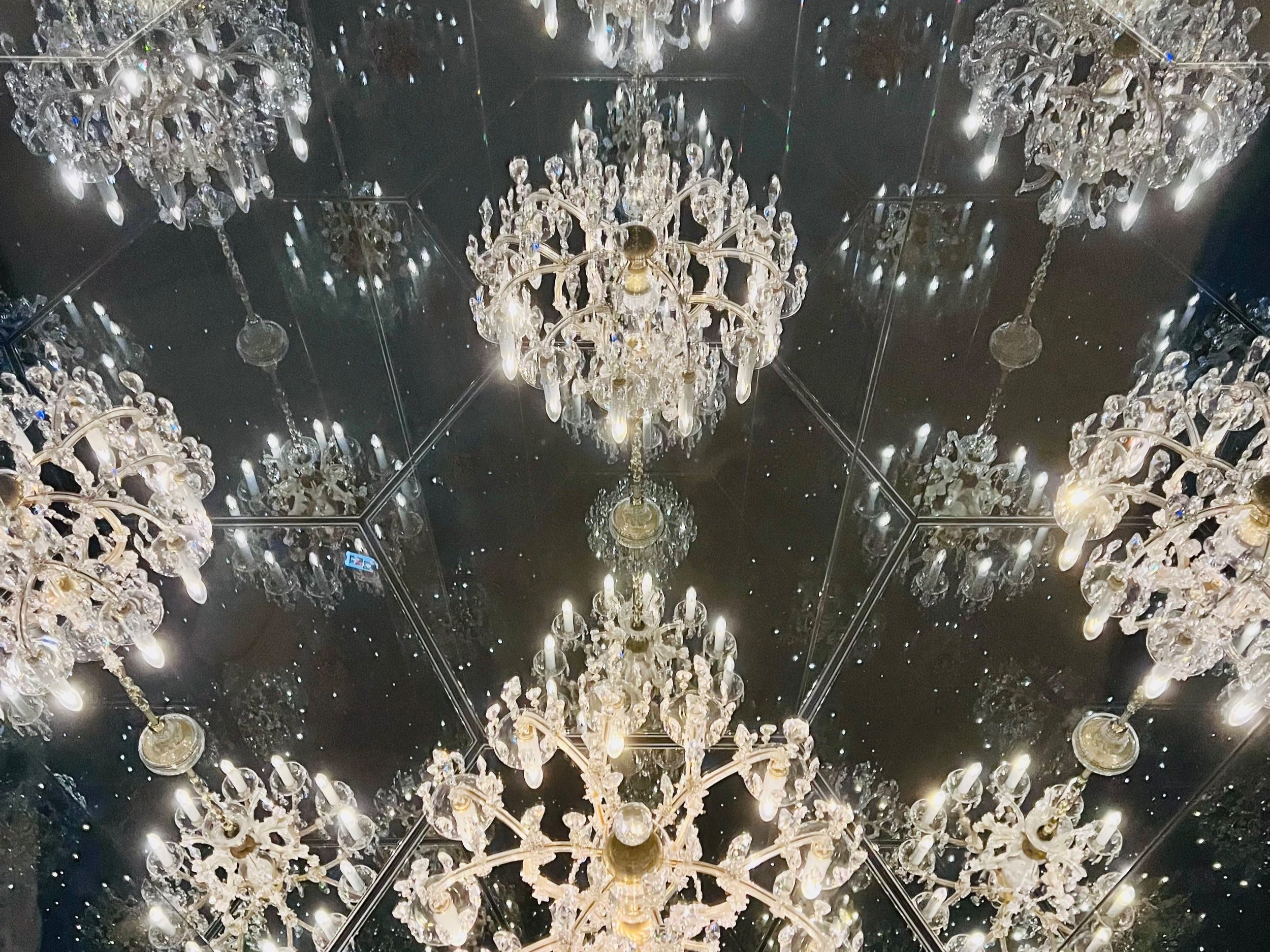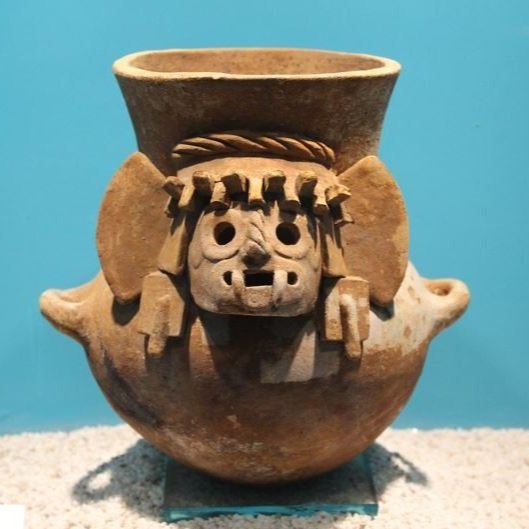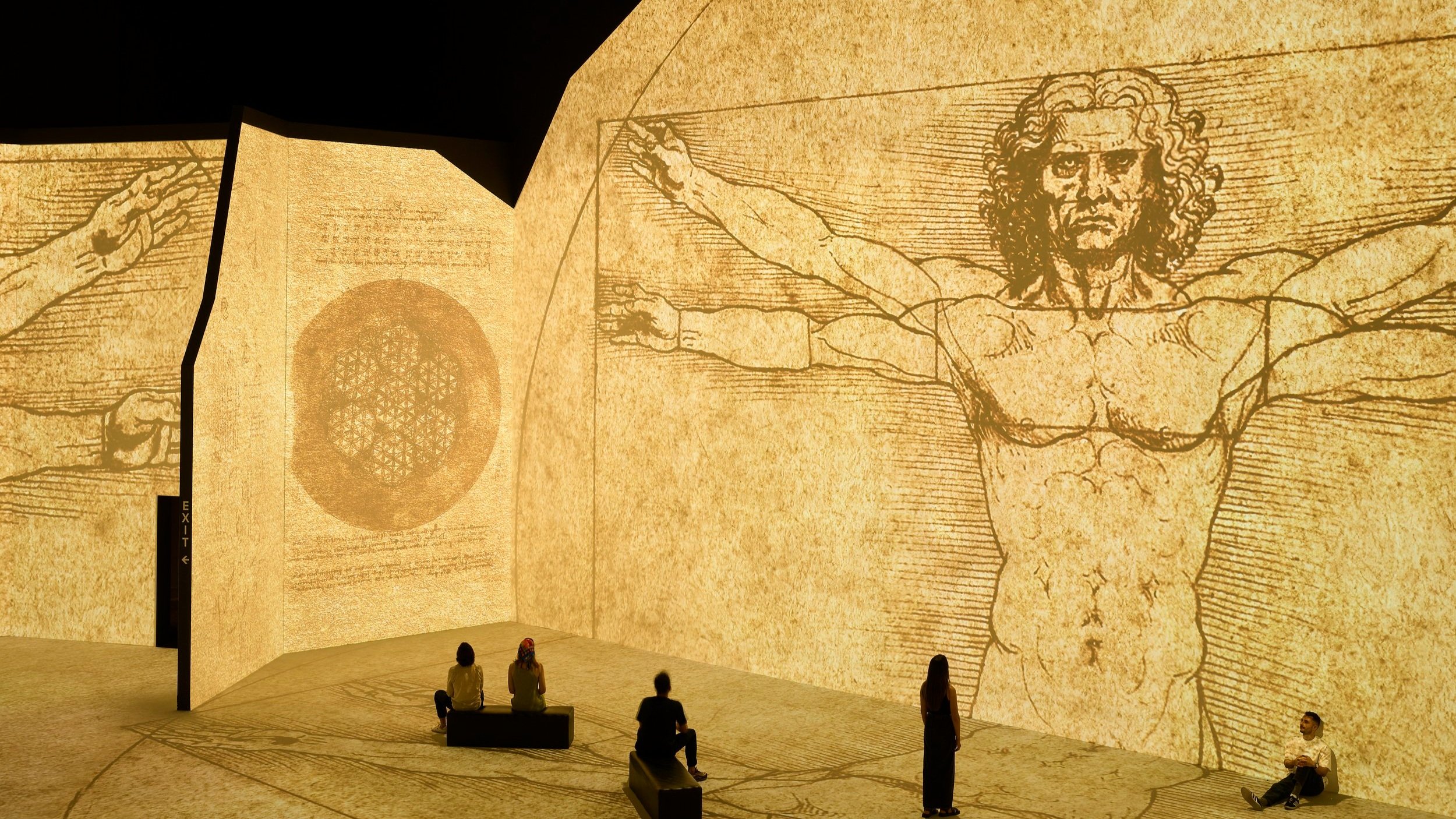What is Yayoi Kusama famous for?
Courtesy of Ota Fine Arts; Victoria Miro; David Zwirner © YAYOI KUSAMA
Yayoi Kusama is a renowned contemporary Japanese artist whose artistic range spans from painting and sculpture to immersive installations and performance art. She has achieved worldwide acclaim for her pioneering and groundbreaking contributions to the art world, cementing her status as one of the most influential artists of our time.
Kusama’s artistic journey began in Japan in the 1950s, but she gained international recognition after moving to New York City in the 1960s.
Today, her works are celebrated for their vibrant colours, mesmerising patterns, and exploration of themes such as infinity, the sublime, and psychological obsession. Read on to find out more about what Yayoi Kusama is famous for.
To find out where to view art by Yayoi Kusama, read here.
Table of Contents
1. Yayoi Kusama’s Immersive and Experiential Artworks
2. Yayoi Kusama Pioneered Avant-garde Art
3. Yayoi Kusama’s Signature Style and Artistic Vision
1. Yayoi Kusama’s Immersive and Experiential Artworks
Infinity Mirror Room by Yayoi Kusama
Yayoi Kusama's Infinity Mirror Rooms are undoubtedly her most renowned and iconic creations.
These immersive installations have captivated audiences worldwide, transforming ordinary spaces into transcendent realms of infinite wonder.
The concept behind the "Infinity Mirror Rooms" is deceptively simple yet profoundly enchanting.
By strategically arranging mirrors and carefully placed lighting, Yayoi Kusama creates a dazzling illusion of boundless space that seems to stretch endlessly in all directions. Visitors are enveloped in a mesmerising kaleidoscopic experience, where reality and reflection blur seamlessly.
Upon entering one of these rooms, the viewer is instantly transported to a surreal and otherworldly environment. The mirrored surfaces reflect and multiply the elements within, creating a captivating visual labyrinth that defies spatial boundaries.
Whether it’s a field of glimmering LED lights, vibrant polka-dotted sculptures, or shimmering pumpkin-shaped forms, the repetitive patterns and reflections evoke a sense of both wonder and disorientation.
The "Infinity Mirror Rooms" have become a cultural phenomenon, attracting massive crowds and long queues wherever they are exhibited.
Filled with the Brilliance of Life by Yayoi Kusama at Tate Modern, London
In the age of social media, these installations have proven to be highly Instagrammable, with visitors eager to capture and share their immersive experiences. The unique and visually striking nature of these works has made them a must-see attraction for art enthusiasts and casual visitors alike. Mainly because:
The rooms offer a captivating interplay between the physical and the illusory, challenging our perceptions of space and reality.
The dazzling reflections and entralling patterns create an otherworldly atmosphere that invites contemplation and introspection.
Yayoi Kusama has masterfully harnessed the power of illusion and immersion, creating unforgettable experiences that transport visitors into realms of boundless imagination and infinite possibility.
2. Yayoi Kusama Pioneered Avant-garde Art
Yayoi Kusama’s influence on the avant-garde art scene of 1960s New York was nothing short of revolutionary.
She was a trailblazer who pushed the boundaries of artistic expression, pioneering new forms that challenged traditional conventions.
During this pivotal period, Yayoi Kusama emerged as a pioneering force in several groundbreaking art forms, including performance art, installation art, and environmental sculpture.
Her bold and unconventional approach paved the way for a new era of artistic exploration and experimentation.
With her provocative and often controversial performance pieces, Kusama challenged societal norms and confronted taboo subjects head-on.
Her installations transformed ordinary spaces into captivating environments, enveloping viewers in a world of her own creation.
Through her environmental sculptures, she blurred the lines between art and life, inviting viewers to engage with their surroundings in new and profound ways.
Yayoi Kusama’s influence extended beyond her own works, influencing her contemporaries, including the legendary Andy Warhol. Her fearless approach and boundary-pushing aesthetic inspired Warhol and others to embrace new forms of artistic expression, contributing to the vibrant and dynamic art scene of the time.
To further cement her notoriety, Kusama staged a series of provocative public happenings that captured the attention of the art world and the general public alike. These events often involved nudity, confrontational themes, and unconventional locations, pushing the boundaries of what was considered acceptable in art.
Her bold and unapologetic approach garnered both admiration and controversy, solidifying her reputation as a fearless and uncompromising artist.
3. Yayoi Kusama’s Signature Style and Artistic Vision
Courtesy Ota Fine Arts and Victoria Miro, London/Venice. © YAYOI KUSAMA
Yayoi Kusama's signature style is defined by her use of repetitive patterns, most notably polka dots and nets, which are deeply rooted in her personal experiences and psychological state. These motifs serve as a visual manifestation of her hallucinations and obsessive thoughts, lending an autobiographical depth to her artistic vision.
The obsessive repetition of polka dots, which appears in many of Kusama’s works, is a direct reflection of the hallucinations she has experienced since childhood.
These recurring visions of endlessly multiplying dots and patterns have been a constant presence in her life, shaping her artistic expression in a profoundly personal way.
Similarly, the use of nets and mesh patterns in her sculptures and installations is a direct representation of the hallucinations she experienced, where she saw the world covered in a vast, interconnected web.
These intricate and enveloping forms symbolise the complexity of the mind and the entanglement of thoughts and emotions.
The nets create a sense of both entrapment and liberation, reflecting Kusama’s struggles with mental illness and her desire to break free from the confines of her own psyche.
Through these patterns, she explores themes of psychological obsession, vulnerability, and the fragility of the human experience.
At the core of Kusama’s artistic vision lies an intense autobiographical narrative. Her works are deeply personal expressions of her inner world, serving as a therapeutic outlet for her struggles with mental health.
4. Yayoi Kusama’s Thematic Exploration
Yayoi Kusama’s art is a multifaceted exploration of profound concepts that delve into the realms of infinity, the sublime, feminism, and psychological obsession.
With an unwavering commitment to self-expression, she has utilised various mediums to give voice to these themes, creating a rich and diverse body of work.
Chandelier of Grief by Yayoi Kusama at Tate Modern, London
Through her iconic "Infinity Mirror Rooms" and intricate polka-dotted installations, Kusama invites viewers to contemplate the boundlessness of space and the vastness of the universe.
Her works often evoke a sense of awe and wonder, tapping into the sublime and inviting introspection on the human experience.
Moreover, Kusama’s art serves as a powerful commentary on feminism, challenging societal norms and advocating for the empowerment of women artists.
To express these multifaceted themes, Kusama has embraced a diverse range of mediums, including:
Painting: Her vibrant canvases, often adorned with enticing patterns, capture the intensity of her experiences and visions.
Sculpture: From her iconic pumpkin sculptures to her enveloping installations, Kusama’s three-dimensional works invite viewers to engage with space and form in new ways.
Poetry and novels: Through her literary works, Kusama delves deeper into her personal narratives, offering a more intimate exploration of her thoughts and emotions.
By seamlessly blending various artistic disciplines, Kusama has created a unique and immersive experience for audiences, allowing them to engage with her themes on multiple levels.
Her ability to convey complex ideas and emotions through diverse mediums has solidified her as a true visionary and a pioneering force in the art world.
5. Yayoi Kusama’s Global Recognition and Legacy
Courtesy of Ota Fine Arts; Victoria Miro; David Zwirner © YAYOI KUSAMA
Yayoi Kusama’s journey to global fame and recognition reached its apex in the 2010s, propelled by the overwhelming popularity of her immersive exhibitions.
These captivating installations, which had been a hallmark of her work for decades, suddenly captured the imagination of audiences worldwide, catapulting Kusama into the spotlight as a celebrated artist.
The demand for her exhibitions was unprecedented, with long queues and sold-out tickets becoming a common sight wherever her works were displayed.
Museums and galleries around the world clamoured to host her mesmerising installations, recognising their ability to draw massive crowds and generate a cultural phenomenon.
As social media platforms became increasingly visual, her kaleidoscopic creations became highly sought-after backdrops for stunning photographs and selfies.
This surge in popularity also translated into record-breaking sales and recognition within the art world.
Kusama’s status as a top-selling living female artist solidified her legacy, with her works fetching staggering prices at auctions and commanding the attention of collectors and institutions globally.
Her retrospective exhibitions at major museums, such as the Tate Modern and the Hirshhorn Museum, further cemented her position as a pioneering force in contemporary art.
Today, Kusama’s impact extends far beyond her artistic achievements, as she continues to inspire and influence a new generation of artists and creative minds.
I hope you have found this information about Yayoi Kuama interesting and helpful. Please feel free to email me your thoughts at sarahransomeart@gmail.com.
For more articles about immersive art, please read here.












